Spanish-British culture figures analyze the bilateral cultural relationship after Brexit
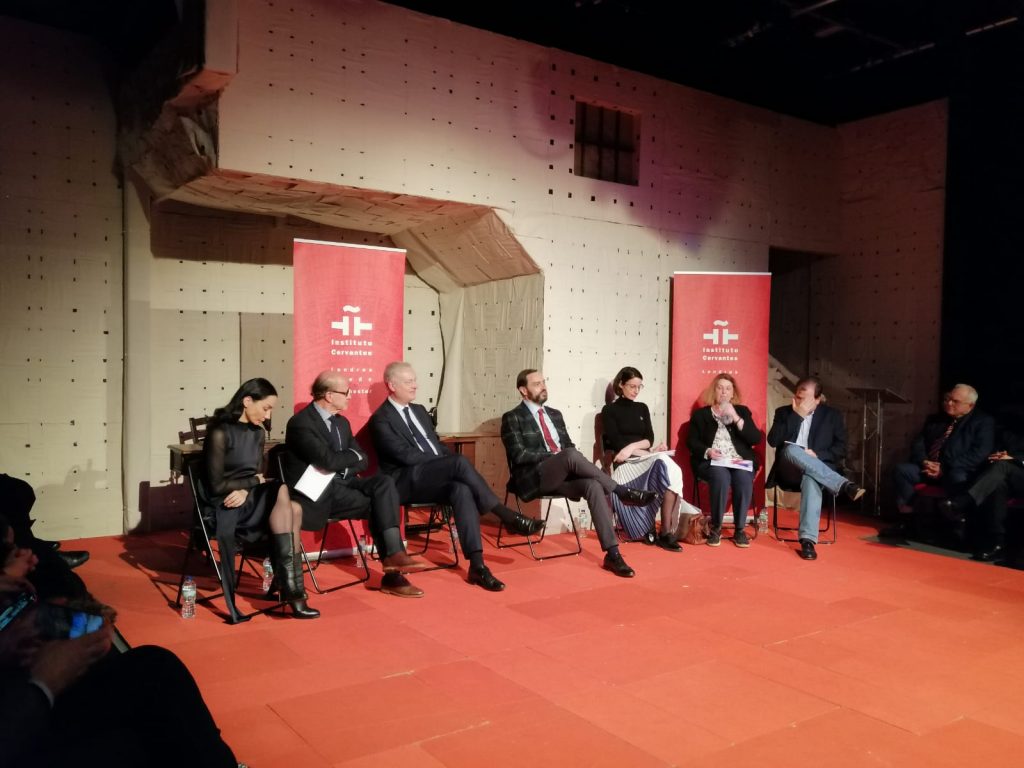
Outstanding figures of British Hispanic culture have participated in the round table Future: English & Hispanic Culture After Brexit, in which they highlighted the necessity of unifying both countries to face the challenges and seize the opportunities after Brexit. One of the main issues discussed focused on the relevance of Spanish as a relevant language for everyday life and its incredible growth in British schools. The event took place at the Cervantes Theatre under the auspices of the Instituto Cervantes in London and with support from the Spanish Embassy.
The round table was introduced by the Ambassador of Spain to the United Kingdom, Carlos Bastarreche as well as the Ambassador of Honduras to the United Kingdom. Subsequently, the director of Instituto Cervantes, Luis García Montero, paid a tribute to British Hispanism, praising the work of great historians and academics such as Sir John Elliott, Sir Paul Preston and the recently deceased, Trevor Dadson.
The round table was moderated by the correspondent of El País in the United Kingdom, Rafa de Miguel, and had the following speakers: the director of the English National Ballet (ENB), Tamara Rojo; the Ambassador of Ecuador to the United Kingdom and novelist, Jaime Marchán; former United Kingdom ambassador to Spain, Simon Manley; the director of the Institute for Modern Languages Research (IMLR), Catherine Davies; the president of the Society of Spanish Scientists in the United Kingdom (CERU), Rocio Gaudioso; and the researcher of the Elcano Royal Institute, Ignacio Molina.
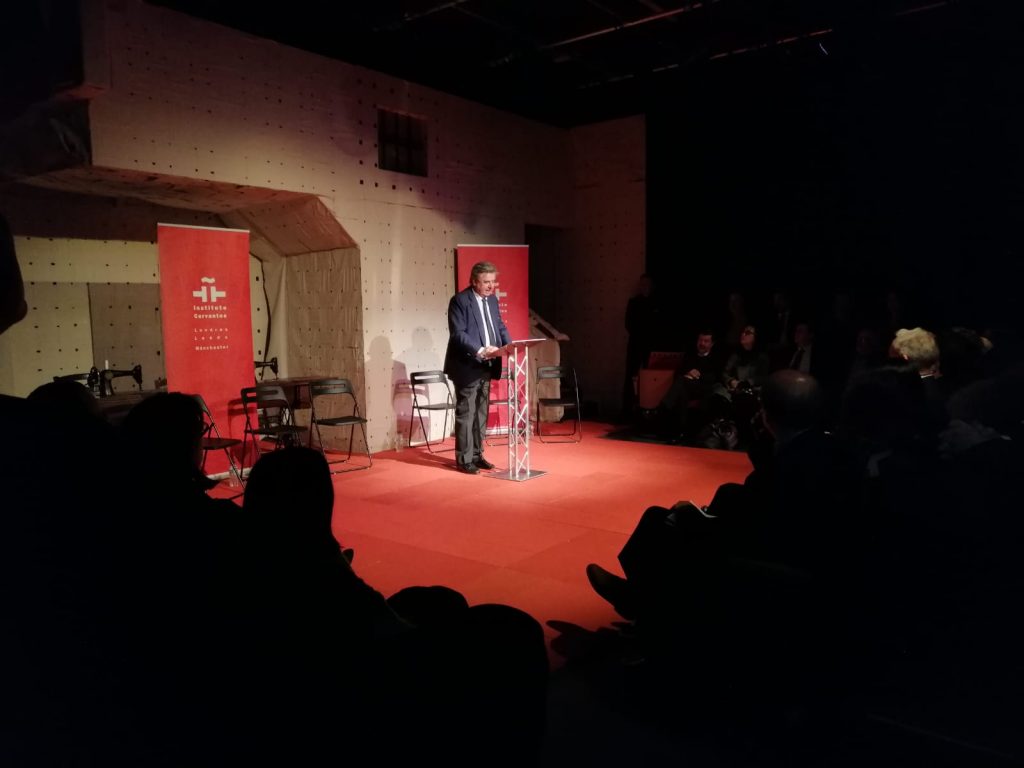
The value of language as a human right
The Ambassador of Ecuador to the United Kingdom and novelist, Jaime Marchán, pointed out that Brexit is “the democratic realisation of the decision of a member country to leave the EU”. However, he said that, like any change, it can also be «seen as an opportunity» and believes that, from now on, we will see a European country with greater autonomy to play an important global role in all areas, including cultural aspects.
For Marchán, Brexit «invites us to reflect on the universal power of the English language beyond all borders» and cited a memorable phrase by George Steiner, a fundamental figure of critical thinking of the twentieth century, which in his opinion summarises the perfection the multicultural sense of language and literature: «Give me a work table and I already have a homeland.»
In fact, his commitment as Ambassador is “for a better reciprocal knowledge of both languages: Spanish and English”, highlighting how the Cervantes Institute and the British Council are an important cultural base to increase better and greater knowledge, not only of the languages, but of the Latin American and English cultures. But language is not just words, and as such, he insisted on the importance of «the value of language as a human right.»
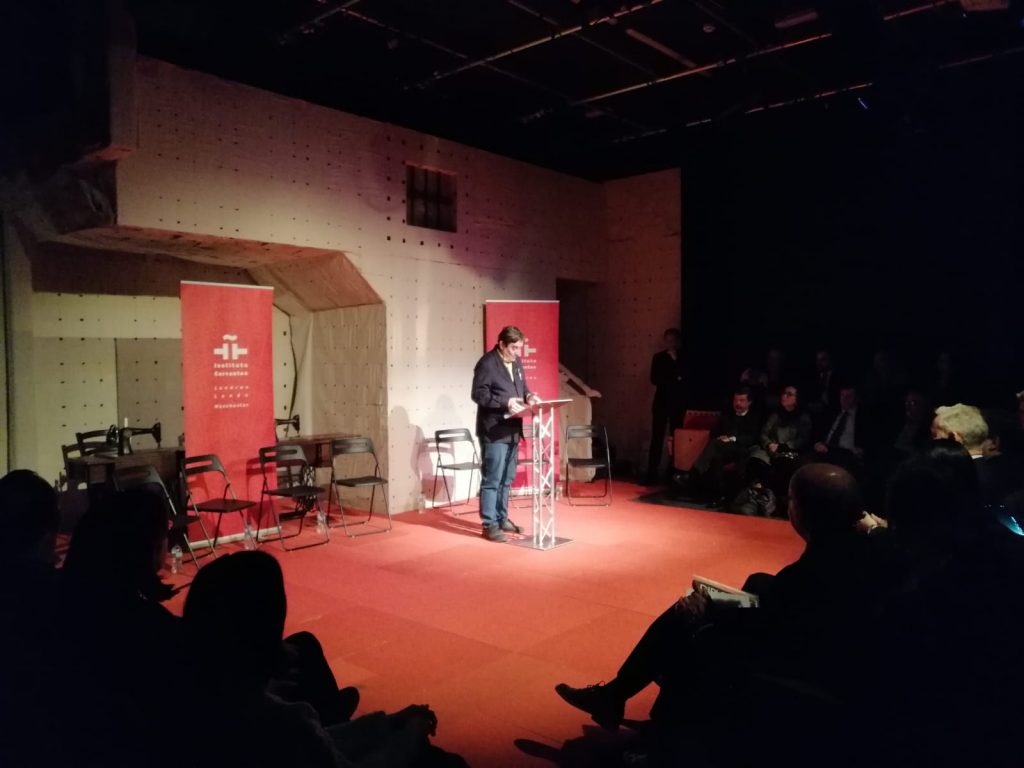
«The incredible growth» of Spanish in British schools
The former United Kingdom ambassador to Spain, Simon Manley, hopes that the future of the cultural relationship between the United Kingdom and the Hispanic world after Brexit will be “very rich”, extolling the links and opportunities, especially “thanks to the efforts of so many Spaniards so talented in our country. ”
For Manley, the current challenge is «uncertainty and false news” but he appreciates that future opportunities»are more important». Our two countries are proud of their great traditions, but with international views and innovative visions. In addition, he highlighted “the incredible growth” of Castilian in British schools, and how, the Hispanic culture advances in several dimensions, with Netflix series such as La casa de papel a la flamenco, cine, or gastronomia.
Spanish, a language relevant to everyday life
The director of the Institute for Modern Languages Research (IMLR), Catherine Davies, noted that in the last ten years, the number of students enrolling in modern languages has decreased, especially in German and French, but not in the case of Spanish and Portuguese, which have grown in importance, status and impact in the higher education sector.
In the case of Spanish studies in schools, Davies believes that interest in Spanish has grown tremendously in the last 20 years: “Spanish is considered relevant for everyday life, mainly because most Britons and their children have visited Spain and have spent their holidays there. Many British expatriates live in Spain, especially grandparents. Spanish is an easy language to acquire at a basic level, so communication can be established quickly. Young people are motivated, feel they are making progress and can test their language skills on vacation. ”
Davies points out that Brexit will make «it will be more difficult to recruit university professors and professors from Spain» and did not hide her concern about how «the constant traffic of goods and people between the two countries can be seriously compromised». However, Davies also pointed out that British interest in Spain started prior to the entry of the United Kingdom into the EU.
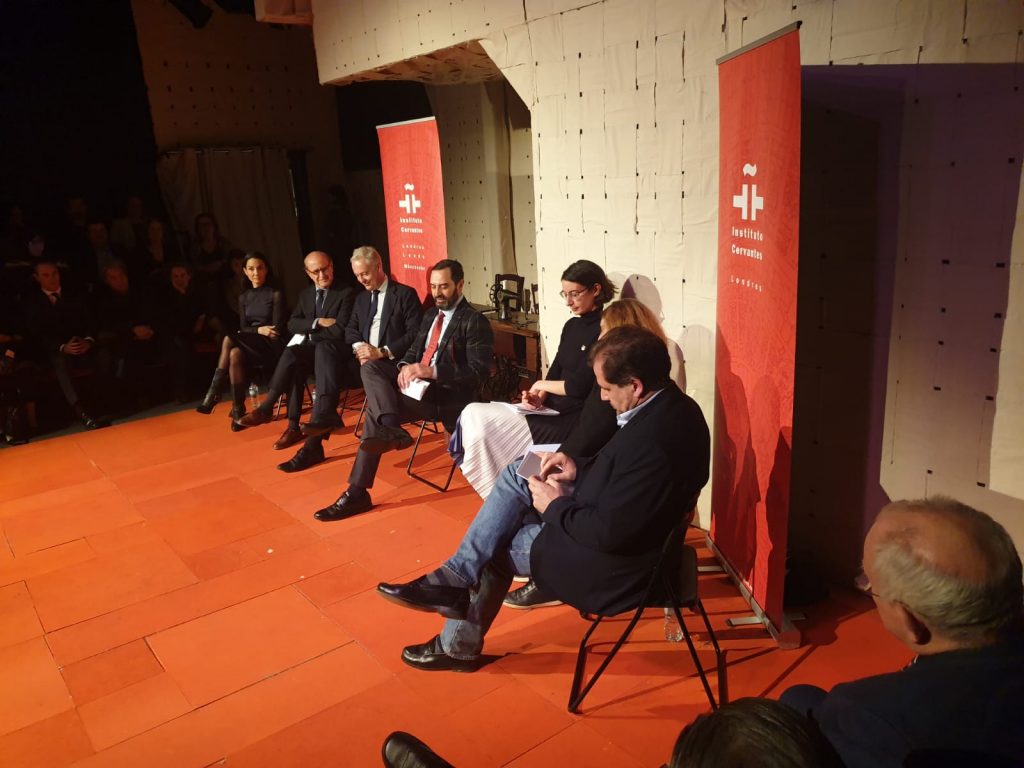
United Kingdom and the European Union are needed
The president of the Society of Spanish Scientists in the United Kingdom (CERU), Rocio Gaudioso, stressed that the scientific community is in a situation with respect to Brexit which is, «at the same time, an opportunity and a challenge: research cannot be done in isolation, the United Kingdom and the European Union need each other to maintain their competitiveness and to face the social and technological challenges that come ”.
Gaudioso also pointed out that Spanish-British relations in research are “mature and well founded in respect and admiration between both countries’. This situation can help reduce the negative effects of Brexit, but he stressed that “the damage is already becoming visible and it can only be prevented with the strength of diplomacy and scientific collaboration. Our governments must remember our common objectives so that we can face the upcoming challenges”.
Gaudioso is clear that “research has always been, and always will be, a global mission. The challenges we face cannot be solved by countries in isolation and this is something that both researchers and governments know. The promises and good wishes are there but now we need the political will on both sides of the channel to reflect this desire and make a relationship as close as possible so that the research community can continue working together. ”
Two aspects of the future relationship between the United Kingdom and Spain
During the round table, the researcher of the Elcano Royal Institute, Ignacio Molina, alluded to two aspects of the future relationship between the United Kingdom and Spain. The first focuses on a more European dimension: trying to answer the question of why the British perception of the rest of EU citizens has always been so different about what the integration process is and should be .
“Among the 27 (and singularly in Spain) it has tended mostly to see Europe as the solution to national problems in terms of peace, security, prosperity, welfare, normalisation, democracy. On the other hand, neither the elites nor the public opinion of the United Kingdom has been deeply aware that their national being was «problematic» or «threatened» and, therefore, they have not seen the EU as that great company for the future that it was its own, but rather as a pragmatic calculation or a simple lesser evil, ”said Molina.
In the second aspect of his participation in the table, he dealt specifically with the bilateral relationship between the United Kingdom and Spain. In this case, he was interested in raising, with some optimistic provocation, the opinion “that there is no longer enmity between two States in the History of International Relations (partly because they are two of the oldest States in the world) nor is there another case in two countries that, being neither neighbors nor sharing language, now have such an intense relationship and potential for harmony. Harmony that at the moment has not been expressed so much in politics (partly because of the very different ways in which both countries view European integration or the old contentious matter of Gibraltar) but it is interesting to take into account the focus of the rest of the speakers at the table, in the cultural, personal and business aspects ”.
For Molina, it is clear that “Brexit marks a before and after in how we can relate between the United Kingdom and the EU. It is inevitable that the relationship suffers on all levels. And we are waiting to see how that agreement of the future is shaped from 2021. Right now, the main challenge is to avoid a hard Brexit, although it cannot be entirely optimistic. However, I don’t think you have to be so pessimistic about the specific Hispanic-British link. ”
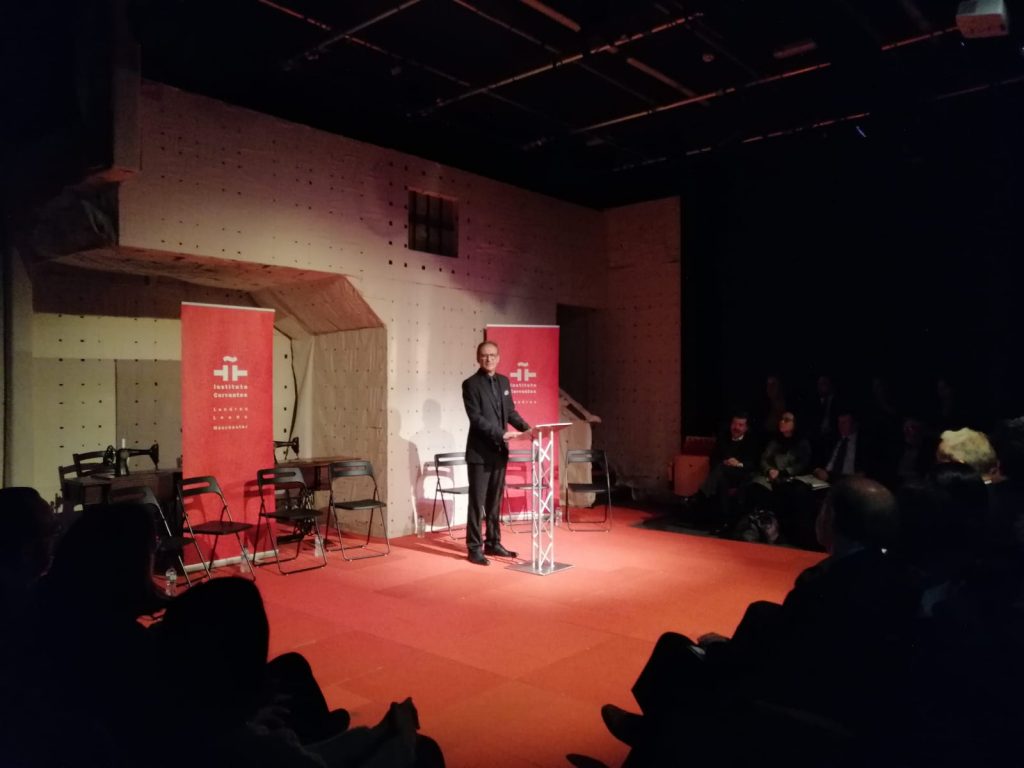
Poetry reading at the Cervantes Theatre
The event concluded with a recital of Spanish love poetry in tribute to the Spanish Trevor Dadson in charge of the artistic director of the Cervantes Theatre, Jorge de Juan. This is the first Spanish-speaking theatre in the history of British theatre and its associate director called for the United Kingdom and Spain to consolidate «the strong ties that have always existed between our two communities.»
“At the Cervantes Theatre, now more than ever, we have to continue spreading our culture and our language, which continues to grow and is studied by British students more than ever. We want to be the gateway for many young Spaniards and Latin Americans who want to continue dreaming of a better future in a country they admire for their history and their people,” said De Juan.
Figuras de la cultura hispano-británica analizan la relación cultural bilateral tras el Brexit

Destacadas figuras de la cultura hispano británica han participado en la mesa redonda Futuro: English & Hispanic Culture After Brexit, en la que destacaron la unión de ambos países para afrontar los retos y aprovechar las oportunidades tras el Brexit, así como la relevancia del español como lengua relevante para la vida cotidiana y su increíble crecimiento en las escuelas británicas. El evento tuvo lugar en el Cervantes Theatre bajo los auspicios del Instituto Cervantes de Londres y con apoyo de la Embajada de España.
La introducción fue a cargo del Embajador de España en Reino Unido, Carlos Bastarreche. A continuación, tomó la palabra el director del Instituto Cervantes de Londres, Luis García Montero, quien realizó un Homenaje al hispanismo británico, elogiando la labor de grandes historiadores y académicos como Sir John Elliott, Sir Paul Preston o el recientemente fallecido Trevor Dadson.
La mesa redonda estuvo moderada por el corresponsal de El País en Reino Unido, Rafa de Miguel, y contó con los siguientes ponentes: la directora del English National Ballet (ENB), Tamara Rojo; el Embajador del Ecuador en el Reino Unido y novelista, Jaime Marchán; el ex embajador de Reino Unido en España, Simon Manley; la directora del Institute for Modern Languages Research (IMLR), Catherine Davies; la presidenta de la Sociedad de Científicos Españoles en el Reino Unido (CERU), Rocio Gaudioso; y el investigador del Real Instituto Elcano, Ignacio Molina.

El valor de la lengua como derecho humano
El Embajador del Ecuador en el Reino Unido y novelista, Jaime Marchán, apuntó a que el Brexit es “la concreción democrática de la decisión de un país miembro de salir de la UE”. Sin embargo, precisó que, como todo cambio, puede “ser visto también como una oportunidad” y cree que, en adelante, veremos un país europeo con mayor autonomía para desempeñar un papel global importante en todos los ámbitos, incluido el cultural.
Para Marchán, el Brexit “nos invita a reflexionar en el poder universal de la lengua inglesa más allá de toda frontera” y citó una frase memorable de George Steiner, figura fundamental del pensamiento crítico del siglo XX, que en su opinión, resume a la perfección el sentido pluricultural de la lengua y de la literatura: “Denme una mesa de trabajo y ya tengo una patria”.
De hecho, su apuesta como Embajador es “por un mejor conocimiento recíproco de ambas lenguas: el español y el inglés”, destacando como el Instituto Cervantes y el British Council son una base cultural importante para incrementar un mejor y mayor conocimiento, no solo de las lenguas, sino de las culturas iberoamericana e inglesa. Pero la lengua no es solo palabras, y así, quiso reivindicar “el valor de la lengua como derecho un derecho humano”.

“El increíble crecimiento” del castellano en las escuelas británicas
El ex embajador de Reino Unido en España, Simon Manley, espera que el futuro de la relación cultural entre Reino Unido y el mundo hispano después del Brexit sea “riquísima”, ensalzando los vínculos y oportunidades, sobre todo “gracias a los esfuerzos de tantos españoles tan talentosos en nuestro país”.
Para Manley, el reto actual es “la incertidumbre y las noticias falsas”. Mientras que las oportunidades “son más importantes”, con dos países orgullos de sus grandes tradiciones, pero con vistas internacionales y visiones innovadoras. Además, destacó “el increíble crecimiento” del castellano en las escuelas británicas, y como, la cultura hispana avanza en dimensiones varias, con series de Netflix como La casa de papel hasta el flamenco, el cine, o la gastronomía.
Español, una lengua relevante para la vida cotidiana
La directora del Institute for Modern Languages Research (IMLR), Catherine Davies, destacó como en los últimos diez años, el número de estudiantes que se matriculan en lenguas modernas ha disminuido, especialmente en alemán y francés, pero no en el caso del español y el portugués, que han crecido en importancia, estatus e impacto en el sector de la educación superior.
En el caso del estudio del español en los colegios, Davies cree que el interés por el español ha crecido enormemente en los últimos 20 años: “El español se considera relevante para la vida cotidiana, principalmente porque la mayoría de los británicos y sus hijos han visitado España y han pasado sus vacaciones allí. Muchos expatriados británicos viven en España, especialmente los abuelos. El español es un idioma fácil de adquirir en un nivel básico, por lo que la comunicación se puede establecer rápidamente. Los jóvenes están motivados, sienten que están progresando y pueden probar sus habilidades lingüísticas en vacaciones”.
Davies apunta que “será más difícil reclutar profesores y profesores universitarios de España” y no ocultó su preocupación por si “el tráfico constante de bienes y personas entre los dos países puede verse seriamente comprometido”, sin embargo, apuntó a que el interés británico en España es anterior a la entrada de Reino Unido en la UE.

Reino Unido y la Unión Europea se necesitan
La presidenta de la Sociedad de Científicos Españoles en el Reino Unido (CERU), Rocio Gaudioso, destacó que la comunidad científica se encuentra en una situación con respecto al Brexit que es, “a la vez, una oportunidad y un reto: la investigación no puede realizarse en aislamiento, Reino Unido y la Unión Europea necesitan el uno de la otra para mantener su competitividad y poder afrontar los retos sociales y tecnológicos que vienen”.
Gaudioso puntualizó que que las relaciones hispano-británicas en materia de investigación son “maduras y están bien fundadas en respeto y admiración entre ambos países”, con lo que situación puede ayudar a disminuir los efectos negativos del Brexit, pero recalcó que “los daños ya se están haciendo visibles y tan solo con una fuerte actividad de diplomacia y colaboración científica, en la que prevalgan nuestros objetivos comunes, podremos hacer frente a los retos que nos vienen”.
Gaudioso tiene claro que “la investigación siempre ha sido, y siempre será, una misión global. Los retos a los que nos enfrentamos no podrán ser solucionados por países en aislamiento y esto es algo que tanto los investigadores como los gobiernos saben. Las promesas y buenos deseos están ahí, necesitamos que la voluntad política en ambos lados del canal refleje este deseo y hagan posible una relación lo más estrecha posible para que la comunidad investigadora pueda seguir trabajando junta”.
Dos vertientes de la relación futura entre el Reino Unido y España
Durante la mesa redonda, el investigador del Real Instituto Elcano, Ignacio Molina, aludió a dos vertientes de la relación futura entre el Reino Unido y España. La primera se centra en la dimensión más europea, tratando de responder a la pregunta de por qué ha sido siempre tan distinta la percepción que han tenido los británicos del resto de los ciudadanos de la UE sobre lo que es y debe ser el proceso de integración.
“Entre los 27 (y singularmente en España) se ha tendido mayoritariamente a ver a Europa como la solución a los problemas nacionales en términos de paz. seguridad, prosperidad, bienestar, normalización, democracia. En cambio, ni las elites ni la opinión pública del Reino Unido ha tenido conciencia profunda de que su ser nacional era «problemático» o estaba «amenazado» y, por tanto, no han visto a la UE como esa gran empresa de futuro que les era propia, sino más bien como un cálculo pragmático o un simple mal menor”, recalcó Molina.
En la segunda vertiente de su participación en la mesa, trató la relación más específicamente bilateral entre Reino Unido y España. En este caso, le interesó plantear, con cierta provocación optimista, “que no hay en la Historia de las relaciones internacionales una enemistad más larga entre dos Estados (en parte porque son dos de los Estados más antiguos del mundo) y, a la vez, tampoco hay otro caso de dos países que no siendo vecinos ni compartiendo idioma tengan ahora mismo una relación tan intensa y tanto potencial de armonía. Armonía que por el momento no se ha expresado tanto en lo político (en parte por la recién comentada muy distinta manera en que ambos países veían la integración europea o por el viejo contencioso de Gibraltar) sino mucho más, y esto es lo interesante teniendo en cuenta el enfoque del resto de ponentes en la mesa, en los aspectos culturales, personales y empresariales”.
Para Molina, es evidente que “el Brexit marca un antes y un después en la forma de relacionarse entre Reino Unido y la UE. Es inevitable que la relación sufra a todos los niveles. Y estamos a la espera de ver cómo se plasma ese acuerdo de futuro a partir de 2021. Ahora mismo el principal reto es evitar un Brexit demasiado duro, aunque no se puede ser del todo optimista. Sin embargo, no creo que haya que ser tan pesimista en el vínculo concreto hispano-británico”.

Lectura de poesía en el Cervantes Theatre
El acto concluyó con un recital de poesía amorosa española en homenaje al hispanista Trevor Dadson a cargo del director artístico del Cervantes Theatre, Jorge de Juan. Se trata del primer teatro de habla hispana en la historia del teatro británico y su director asociado llamó a que Reino Unido y España consoliden “los fuertes lazos que siempre han existido entre nuestras dos comunidades”.
“En el Cervantes Theatre, ahora más que nunca, tenemos que seguir difundiendo nuestra cultura, nuestro idioma, que no deja de crecer y que es estudiado por los estudiantes británicos más que nunca. Queremos ser la puerta de entrada para muchos jóvenes españoles y latinoamericanos que quieren seguir soñando con un futuro mejor en un país al que admiran por su historia y por sus gentes”, destacó De Juan.
Director of Instituto Cervantes, Luis García Montero, visits London and Oxford
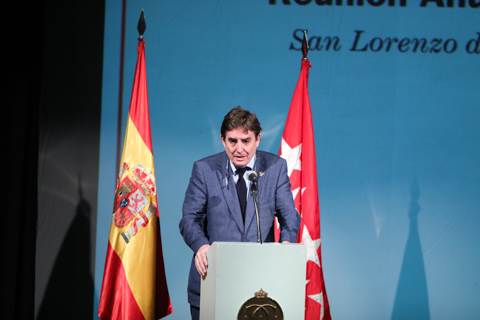
The director of Instituto Cervantes, Luis García Montero, visits London and Oxford from Thursday 27th to Saturday 29th February, with an agenda that includes a tribute to British Hispanist Sir Paul Preston, the participation in the round table: Futuro: English & Hispanic Culture After Brexit and a meeting with the British Council, as well as his attendance to the 50th Anniversary celebrations of the Spanish Sub-Faculty of the University of Oxford and the signing of a memorandum of understanding with Magdalen College.
García Montero’s visit will begin on Thursday 27th with a breakfast with teachers of Spanish for Foreigners (ELE) in the library of Instituto Cervantes in London. At 11:00am, he will hold a meeting with the CEO of the British Council, Sir Ciarán Devane.
The director of Instituto Cervantes will have lunch with creators, academics and Latin American cultural guests. In the afternoon, García Montero will visit the offices of Instituto Cervantes in London, where he will have a tour of the facilities and hold meetings with the staff, as well as with the area directors with whom he will inform about the agreed agreements.
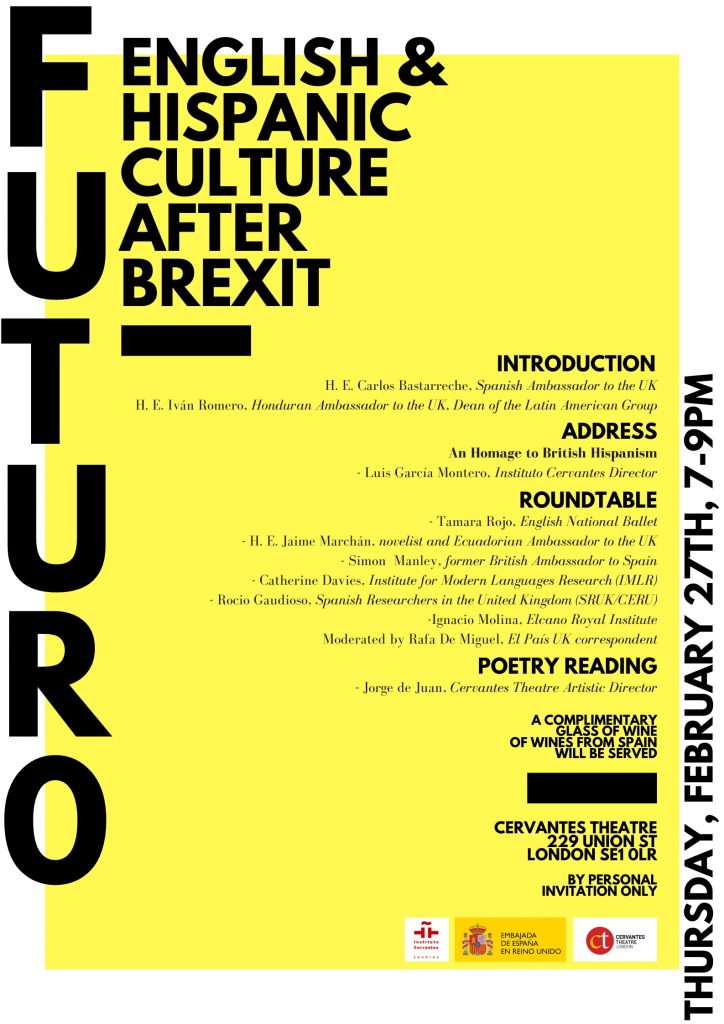
Roundtable: «Future: English & Hispanic Culture After Brexit»
In the evening, García Montero will attend the round table discussion: Futuro: English & Hispanic Culture After Brexit» the Cervantes Theatre. The Ambassador of Spain to the United Kingdom, Carlos Bastarreche, will introduce the evening, attendees of which include the Ambassador of Honduras to the United Kingdom and the Dean of the Latin American Ambassador Group, Iván Romero.
Next, the director of Instituto Cervantes will take the floor and he will deliver a spoken tribute to British Hispanism. The round table will be moderated by the correspondent of newspaper El País in the United Kingdom, Rafa de Miguel, and will have the following speakers: the director of the English National Ballet (ENB), Tamara Rojo; the Ambassador of Ecuador in the United Kingdom and novelist, Jaime Marchán; former United Kingdom Ambassador to Spain, Simon Manley; the director of the Institute for Modern Languages Research (IMLR), Catherine Davies; the president of the Society of Spanish Scientists in the United Kingdom (CERU), Rocio Gaudioso; and the researcher of the Elcano Royal Institute, Ignacio Molina.
The event will end with a recital of love poetry in Spanish in an homage to the recently deceased Hispanist Trevor Dadson, by the associate director of Cervantes Theatre, Jorge de Juan.
At the end of the round table, García Montero will attend a dinner with Spanish and British businessmen in the United Kingdom, including the president of the Spanish Chamber of Commerce in the United Kingdom, Eduardo Barrachina, and Spanish personalities working in the City.
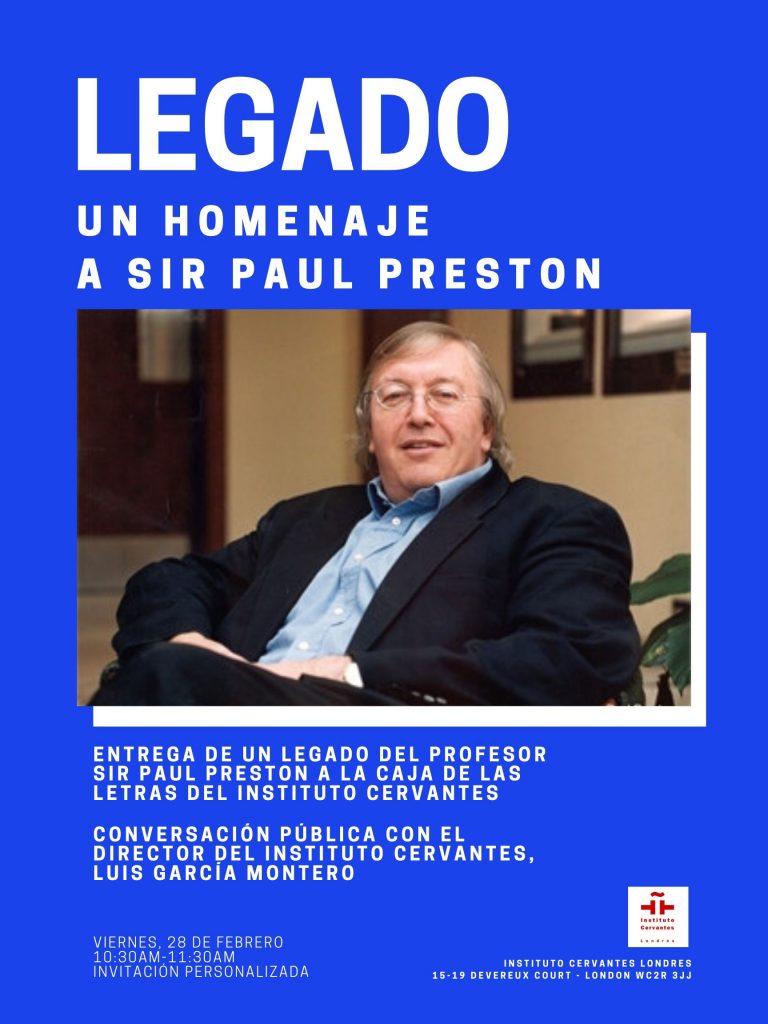
Paul Preston’s legacy
British Hispanst Sir Paul Preston will speak with the press on Friday February 28th, in the library of Instituto Cervantes in London. At 10:30a.m. the tribute will begin, in which the outstanding historian will deliver his legacy to the Caja de las Letras of Instituto Cervantes. Although this is the second donation to the Caja de las Letras from a Hispanist, it is the first donation to be given outside of the building in Madrid itself.
Sir Paul Preston will sign two copies of the assignment document and the director of Instituto Cervantes will keep the bequeathed item in a red briefcase and give Sir Paul Preston the symbolic key and the copy of the assignment document for five years.
Following the ceremony of the Caja de las Letras, they will hold a public conversation about Preston’s outstanding career as a historian.
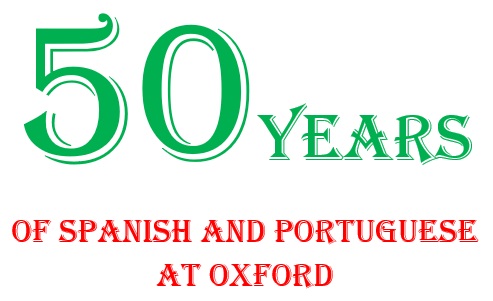
García Montero’s visit to Oxford
On Friday February 28th, García Montero will say a few words and participate in a poetry recital in the framework of the 50th anniversary of the Spanish and Portuguese Sub-Faculty of the University of Oxford.
In addition, García Montero will hold a meeting with the professor and promoter of the Madariaga Series, Juan Carlos Conde, on Saturday 29th at 9:00am. Then, both will visit Magdalen College, where the signing ceremony of the collaboration memorandum between Instituto Cervantes and Magdalen College will take place, with the presence of its president, Sir David Clary.
Visita del director del Instituto Cervantes, Luis García Montero, a Londres y Oxford

El director del Instituto Cervantes, Luis García Montero, visita Londres y Oxford del jueves 27 al sábado 29 de febrero, con una agenda que incluye un homenaje al hispanista británico Sir Paul Preston, la participación en la mesa redonda: «Futuro: British & Hispanic Culture After Brexit» y una reunión con el British Council, así como la asistencia a las celebraciones del 50 Aniversario de la Subfacultad de Español de la Universidad de Oxford y la firma de un memorando de entendimiento con Magdalen College.
La visita de García Montero arrancará el jueves 27 con un desayuno con profesores Español para Extranjeros (ELE) en la biblioteca del Instituto Cervantes de Londres. A las 11:00 horas mantendrá una reunión con el director ejecutivo del British Council, Sir Ciarán Devane.
El director del Instituto Cervantes almorzará con creadores, académicos y actores culturales iberoamericanos. Por la tarde, García Montero visitará las dependencias del Instituto Cervantes de Londres, donde conocerá las instalaciones del centro y mantendrá encuentros con los trabajadores, así como con los directores de área, a los que informará de los acuerdos acordados.

Mesa redonda: «Futuro: English & Hispanic Culture After Brexit»
Esa tarde, asistirá a la mesa redonda: «Futuro: English & Hispanic Culture After Brexit», que tendrá lugar en el Cervantes Theatre. La introducción será a cargo del Embajador de España en Reino Unido, Carlos Bastarreche, y del Embajador de Honduras en Reino Unido y Decano del Grupo de Embajador Latinoamericanos, Iván Romero.
A continuación, tomará la palabra el director del Instituto Cervantes de Londres, quien pronunciará un Homenaje al hispanismo británico. La mesa redonda estará moderada por el corresponsal de El País en Reino Unido, Rafa de Miguel, y contará con los siguientes ponentes: la directora del English National Ballet (ENB), Tamara Rojo; el Embajador del Ecuador en el Reino Unido y novelista, Jaime Marchán; el ex embajador de Reino Unido en España, Simon Manley; la directora del Institute for Modern Languages Research (IMLR), Catherine Davies; la presidenta de la Sociedad de Científicos Españoles en el Reino Unido (CERU), Rocio Gaudioso; y el investigador del Real Instituto Elcano, Ignacio Molina.
El acto concluirá con un recital de poesía amorosa española en homenaje al hispanista Trevor Dadson, recientemente fallecido, a cargo del director asociado del Cervantes Theatre, Jorge de Juan. Al finalizar, García Montero asistirá a una cena con empresarios españoles y británicos en Reino Unido, en la que también estará el presidente de la Cámara de Comercio en Reino Unido, Eduardo Barrachina, y personalidades españolas de la City.

Legado de Paul Preston
El hispanista británico Sir Paul Preston atenderá a la prensa el viernes 28 de febrero, en la biblioteca del Instituto Cervantes de Londres. A las 10:30 horas dará comienzo el homenaje, en el que el destacado historiador hará entrega de su legado a la Caja de las Letras del Instituto Cervantes, tratándose del primero que se hace en la distancia y el segundo que realiza un hispanista.
Sir Paul Preston firmará dos copias del documento de cesión y el director del Instituto Cervantes guardará el objeto legado en un maletín rojo y entregará a Sir Paul Preston la llave simbólica y la copia del documento de cesión por cinco años. A continuación, mantendrán una conversación pública sobre su destacado trayectoria como historiador.

Visita de García Montero a Oxford
El viernes 28 de febrero, García Montero dirá unas palabras y participará en un recital de poesía en el marco del 50 aniversario de la Subfacultad de Español y Portugués de la Universidad de Oxford.
Además, mantendrá una reunión con el catedrático e impulsor del Ciclo Madariaga, Juan Carlos Conde, el sábado 29. Acto seguido, ambos visitarán Magdalen College, donde tendrá lugar la ceremonia de firma del memorando de entendimiento de colaboración entre el Instituto Cervantes y Magdalen College, en presencia de su presidente, Sir David Clary.


